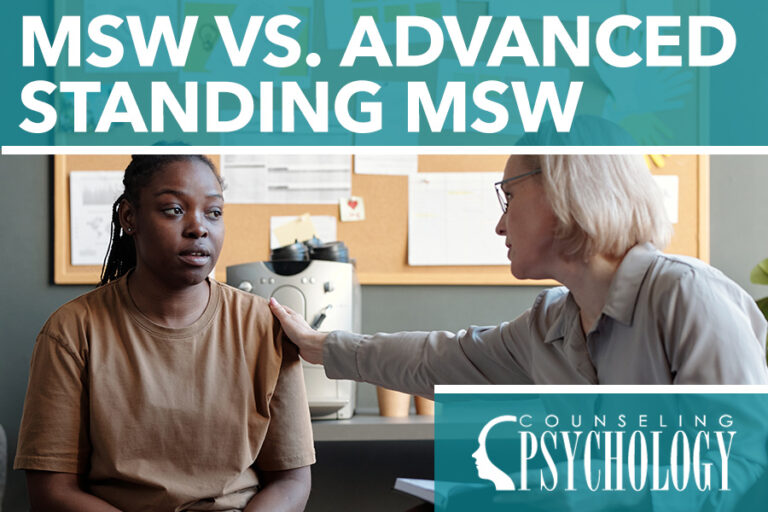MSW vs. Advanced Standing MSW: Which Social Work Degree Path Is Right For You?

For aspiring social workers seeking to advance their careers, obtaining a Master of Social Work (MSW) degree represents a crucial step toward expanded professional opportunities, higher earning potential, and greater clinical responsibilities. However, not all MSW programs follow the same structure or timeline. Prospective students often find themselves weighing the benefits of a traditional MSW program against those of an Advanced Standing MSW option.
This comprehensive comparison examines both pathways, helping you determine which program aligns best with your educational background, career goals, and personal circumstances. Understanding these differences is essential for making an informed decision about your professional future in social work.
What Is a Traditional MSW Program?
A traditional MSW program typically spans two years of full-time study (or three to four years part-time) and is designed for students from diverse educational backgrounds. Whether you hold a bachelor’s degree in psychology, sociology, education, or even business, a traditional MSW program provides the foundational knowledge and skills needed to transition into professional social work practice.
The curriculum generally consists of:
- Foundation-year coursework covering social work theory, ethics, research methods, human behavior, and social policy
- Advanced-year specialization in areas such as clinical practice, administration, community organizing, or policy development
- Approximately 900-1,200 field placement hours across both years
- Research projects or thesis requirements (program-dependent)
Traditional MSW programs accept students from any undergraduate major, making them an accessible option for career-changers or those discovering their passion for social work later in their educational journey.
What Is an Advanced Standing MSW Program?
Advanced Standing MSW programs are accelerated options specifically designed for students who have already completed a Bachelor of Social Work (BSW) degree from a program accredited by the Council on Social Work Education (CSWE). These programs recognize that BSW graduates have already mastered foundational social work knowledge and skills, allowing them to waive the first year of MSW coursework.
Key characteristics include:
- Typically completed in one year of full-time study (or 18-24 months part-time)
- Focus exclusively on advanced practice in specialized areas
- Approximately 500-600 field placement hours
- Direct entry into advanced coursework
- Same degree outcome and professional qualifications as traditional programs
Advanced Standing is essentially an acceleration option that acknowledges and builds upon prior social work education, preventing unnecessary repetition of material already mastered at the undergraduate level.
MSW vs. Advanced Standing MSW: Side-by-Side Comparison
| Feature | Traditional MSW | Advanced Standing MSW |
| Program Length | 2 years full-time, 3-4 years part-time | 1 year full-time, 18-24 months part-time |
| Credit Requirements | 60-64 credits | 30-38 credits |
| Field Placement Hours | 900-1,200 hours | 500-600 hours |
| Eligibility Requirements | Bachelor’s degree in any field | BSW from CSWE-accredited program, minimum GPA (typically 3.0), recent graduation (usually within 5-7 years) |
| Total Tuition Cost | $30,000-$80,000+ | $15,000-$40,000+ |
| Curriculum Focus | Foundation year + Advanced year | Advanced year only |
| Typical Application Requirements | Transcripts, letters of recommendation, personal statement, resume | Same as traditional, plus: BSW field evaluations, social work-specific references |
| Career Outcomes | Full range of MSW-level positions | Full range of MSW-level positions |
Pros and Cons of Traditional MSW Programs
Advantages
- Accessibility: Open to graduates from any undergraduate field, making career transitions possible
- Comprehensive Foundation: Provides thorough grounding in social work principles for those new to the field
- Gradual Skill Development: Builds skills progressively from basic to advanced
- More Field Experience: Offers additional supervised practice hours, potentially enhancing job readiness
- Networking Opportunities: Longer program duration allows more time to build professional connections
Disadvantages
- Time Commitment: Requires two full years of study for full-time students
- Higher Cost: Typically double the tuition expense of Advanced Standing programs
- Delayed Career Advancement: Longer time to degree completion means delayed entry to advanced positions
- Potential Redundancy: May cover material already familiar to students with social science backgrounds
- Extended Time Away from Workforce: Longer period of reduced income for career professionals
Pros and Cons of Advanced Standing MSW Programs
Advantages
- Time Efficiency: Complete your MSW in half the time of traditional programs
- Cost Savings: Significantly lower tuition expenses and living costs
- Faster Career Advancement: Earlier qualification for clinical positions and licensure processes
- Avoids Redundancy: Eliminates repetition of foundational content already mastered in BSW programs
- Recognizes Prior Achievement: Acknowledges and builds upon existing professional knowledge
Disadvantages
- Limited Eligibility: Only available to recent BSW graduates from accredited programs
- Competitive Admission: Often more selective than traditional MSW programs
- Accelerated Pace: Intensive curriculum may be challenging for some students
- Less Field Experience: Fewer supervised practice hours than traditional programs
- Limited Program Availability: Fewer schools offer Advanced Standing options
Who Should Choose a Traditional MSW Program?
A traditional MSW program is ideal for:
- Career-changers coming from unrelated fields
- Recent graduates with non-social work bachelor’s degrees
- Individuals seeking gradual skill development who benefit from a more comprehensive introduction to the field
- Students desiring maximum field experience before entering professional practice
- Those without time constraints who can commit to a longer educational journey
Who Should Choose an Advanced Standing MSW Program?
An Advanced Standing MSW program is best suited for:
- Recent BSW graduates (typically within 5-7 years)
- Practicing social workers with BSW degrees seeking to minimize time away from the field
- Students with strong academic performance in their BSW programs (typically 3.0+ GPA)
- Those seeking cost-effective advancement to clinical or supervisory roles
- Individuals confident in their foundational social work knowledge and ready for advanced content
Key Considerations for Your Decision
When deciding between these program types, consider these factors:
- Educational Background: Do you have a BSW from an accredited program?
- Financial Resources: How will program length affect your budget and financial aid needs?
- Career Timeline: How quickly do you need to enter advanced practice?
- Learning Style: Would you benefit from more gradual skill development or are you ready for an accelerated pace?
- Geographic Flexibility: Are Advanced Standing programs available in your preferred location?
Making the Right Choice for Your Social Work Career
Both traditional and Advanced Standing MSW programs lead to the same degree and qualify graduates for the same positions and licensure opportunities. The “best” option depends entirely on your individual circumstances, prior education, and career goals.
If you hold a BSW and meet the eligibility requirements, Advanced Standing offers a time-efficient, cost-effective path to advanced practice. For those new to social work or transitioning from other fields, traditional programs provide the comprehensive foundation necessary for successful practice.
Regardless of which path you choose, pursuing an MSW represents a significant commitment to professional growth and enhanced service to vulnerable populations. By carefully evaluating your options against your personal and professional needs, you can select the program structure that best supports your journey toward becoming an advanced social work practitioner.



